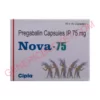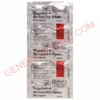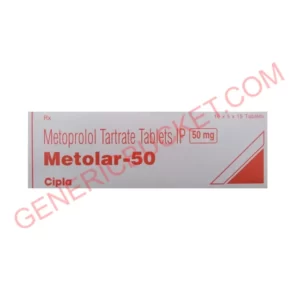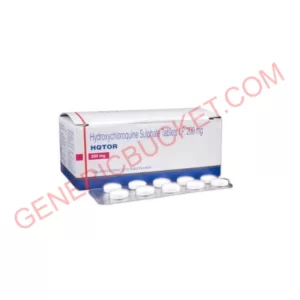Nortryptomer-P Tablet (Pregabalin 75mg/Nortriptyline 10mg)
$46.00 – $120.00Price range: $46.00 through $120.00
| Country of Origin | India |
|---|---|
| Dosage Form | tablet |
| Generic Name | Pregabalin |
| Indication | Neuropathic pain |
| Manufacturer | Dr Reddy's Laboratories Ltd |
| Packaging | 10 tablets in 1 strip |
| Composition | Pregabalin (75mg) + Nortriptyline (10mg) |
| Nortryptomer-P Tablet (Pregabalin 75mg/Nortriptyline 10mg) | |||
| Pack Size | Price | Price/Unit | Add To Cart |
| 50 Tablet/s | $46.00 (0.92/unit) | $0.92 | |
| 100 Tablet/s | $87.00 (0.87/unit) | $0.87 | |
| 150 Tablet/s | $120.00 (0.8/unit) | $0.8 | |
Nortryptomer-P
Nortryptomer-P is a combination of Nortriptyline and Pregabalin which belongs to the group of medicines called Tricyclic antidepressants and Anticonvulsants respectively. NORTRYPTOMER P is indicated for the treatment of neuropathic pain. Neuropathic pain is a chronic painful nerve condition caused by damage or disease affecting the somatosensory (sense of touch) nervous system. It can be caused by injury or disease of spinal cord and/or brain, prolonged diabetes mellitus (Ex. diabetic neuropathy), infectious diseases (such as HIV infection or leprosy), chemotherapy, auto-immune disease (Ex. Guillain-Barre syndrome), post-herpetic neuralgia (a long-lasting painful condition that affects the areas around the skin and nerve fibers where shingles were present), fibromyalgia (generalized musculoskeletal pain with fatigue, and altered sleep, memory, and mood) or by other metabolic dysfunctions. Symptoms include shooting, burning, or stabbing pain for normal daily activities that are typically not painful, tingling and numbness or spontaneous pain (pain without stimulus).
Nortriptyline is a tricyclic antidepressant that acts by inhibiting the movement of pain signals from the brain and pregabalin is an anticonvulsant that acts by blocking the influx of calcium and various pain-causing chemicals through the damaged nerves and the brain, thus causing pain relief.
Continue to take NORTRYPTOMER P as long as your doctor tells you to do so, because premature discontinuation can cause withdrawal symptoms like insomnia, headache, nausea, anxiety, diarrhea, depression, convulsion, and excessive perspiration. NORTRYPTOMER P can increase the risk of suicidal thoughts and behavior in some individuals and therefore, patients (or caregivers) should seek immediate medical advice if any such signs emerge.
NORTRYPTOMER P is not recommended for use in patients having severe heart or kidney disease. Consult your doctor before taking NORTRYPTOMER P. This medicine is not recommended for use in pregnant or breastfeeding women and in children (aged below 6 years). The most common side effects of NORTRYPTOMER P are nausea, vomiting, constipation, dizziness, headache, or somnolence. Consult your doctor if any of the symptoms worsen.
USES OF Nortryptomer-P
- Treats neuropathic pain
HOW NORTRYPTOMER P WORKS
NORTRYPTOMER P effectively relieves nerve pain, where nortriptyline acts by inhibiting the movement of pain signals from the brain by blocking the reuptake of certain chemical messengers (norepinephrine and serotonin) at the pre-synapse, and pregabalin acts by interfering with influx of calcium and various pain signals travelling through the damaged nerves and the brain, thus leading to a significant pain relief in various neuropathic pain states.
DIRECTIONS FOR USE
Take NORTRYPTOMER P as directed by your physician. Take this medicine with or without food, swallow the medicine as a whole and do not crush or chew the medicine. Do not stop taking NORTRYPTOMER P without informing your doctor.
SIDE EFFECTS OF Nortryptomer-P
SERIOUS
COMMON
- Dizziness, drowsiness, headache
- Nausea or vomiting
- Dry mouth
- Diarrhea, constipation, swollen abdomen, flatulence
- Increased appetite, weight gain
- Blurred vision
- Vertigo (spinning sensation)
- Mania, confusion, irritability, disorientation
- Insomnia (lack of sleep) or sleepiness
- Decreased sex drive, erectile dysfunction
- Lack of control over body movements, tremor (shaking)
- Memory impairment, attention disturbance
- Dysarthria (unable to speak properly)
- Numbness or pain in the body
- Generalized edema (swelling of the body including extremities)
- Muscle cramps
- Pain in the joints, back or limbs
- Sore throat
UNCOMMON
- Loss of appetite and weight loss
- Decreased blood glucose level
- Low self-esteem, depression, agitation, hallucinations, nightmares, panic attack, apathy
- Mental impairment or difficulty with thinking
- Increase in sexual interest
- Eye problems (problems in vision, dry eyes, eye irritation, swelling or pain)
- Skin sensitivity, loss of taste
- Weakness or fainting
- Increased sensitivity to noise
- Heart problems (such as changes in heart rate, changes in blood pressure or heart failure)
- Hot flushes
- Difficulty in breathing, dry nose, nasal congestion
- Increased saliva secretion, heartburn, numbness around the mouth
- Skin rash, sweating, chills with fever
- Muscle stiffness or twitching, joint swelling, neck pain
- Pain in breasts
- Difficulty or painful urination, increased urge to urinate
- Excessive thirst, chest tightness
- Severe allergic reactions (such as swollen face, itching, nasal congestion, nasal bleeds, cough, and snoring)
- Painful menstrual periods
- Chillness of hands and feet
RARE
- Ascites (fluid buildup in abdomen)
- Fluid buildup in the lungs
- Discharge from the breast or abnormal breast growth
- Gynecomastia (breast enlargement in males)
- Signs of decreased WBC count (mouth sores, fever, repeated infections)
- Cold sweat, swollen throat, tightness of throat
- Difficulty in swallowing
- Abnormal smell sense
- Altered vision, vision loss, dilated pupils, cross eyes
- Inflammation of the pancreas
- Slow or reduced movement of the body
- Difficulty in writing
- Convulsions
- Irregular menstrual cycle
- Rhabdomyolysis (muscle damage)
- Kidney failure, decreased urine output, difficulty in urination
- Allergic reactions (such as difficulty in breathing, inflammation of the eyes and a serious skin reaction characterized by rash, blisters, pain, and skin peeling)
- Liver problems (such as jaundice (yellowing of the skin and eyes), liver failure or hepatitis (inflammation of the liver))
Stop taking NORTRYPTOMER P and consult your doctor immediately if you experience the following side effects:
- Swollen face or tongue
- Skin redness with blisters or peeling
HOW TO MANAGE SIDE EFFECTS
Nausea and vomiting:
Try to take Nortryptomer-P with or just after a meal or a snack. Stick to simple meals. Avoid eating rich or spicy food. Consult your doctor if the symptom did not improve.
Diarrhoea:
Drink lots of fluids, such as water or fruit juices to keep yourself hydrated. Avoid taking any medicine on your own for treating diarrhea. Consult your doctor if the symptom did not improve.
Headache:
Rest and relax. Drink plenty of fluids such as water or electrolytes. Apply a pain-relieving balm on the head if required. Do not consume too much of alcohol. Consult your doctor if the symptom did not improve.
Dizziness:
Try to rest and relax. Get enough sleep. Avoid driving or operating any tools or machines while you are feeling dizzy. Do not consume too much of alcohol, as it can aggravate your dizziness. Consult your doctor if the symptom did not improve.
Flatulence:
Eat smaller and frequent meals. Eat and drink slowly, and exercise regularly. Consult your doctor if the symptom did not improve.
Constipation:
Eat fiber rich foods such as fresh fruits, vegetables and cereals and drink plenty of water. Try to exercise more regularly. Consult your doctor if the symptom did not improve on its own.
Stomach pain:
Rest and relax. Eat and drink slowly or try to have smaller and frequent meals. Keep a heat pad on your stomach. Do not self-treat on your own and consult your doctor if the symptom did not improve on its own.
WARNING & PRECAUTIONS
PREGNANCY
NORTRYPTOMER P is not recommended for use in pregnant women. Consult your doctor before taking NORTRYPTOMER P.
BREASTFEEDING
NORTRYPTOMER P is not recommended for use in breastfeeding women. Consult your doctor before taking Nortryptomer-P.
DRIVING AND USING MACHINES
Do not drive or operate any tools or machines if you experience dizziness or sleepiness after taking Nortryptomer-P.
ALCOHOL
Avoid consumption of alcohol while taking Nortryptomer-P as it could make you feel dizzier or sleepier.
KIDNEY
NORTRYPTOMER P should be taken with caution in patients with kidney disease. Consult your doctor before taking.
LIVER
NORTRYPTOMER P is not recommended for use in patients having severe liver disease and should be used with caution in patients with liver disease. Consult your doctor before taking Nortryptomer-P.
ALLERGY
Do not take NORTRYPTOMER P if you are allergic to Pregabalin or Nortriptyline or any other tricyclic antidepressants such as amitriptyline, imipramine.
HEART DISEASE
NORTRYPTOMER P is not recommended for use in patients having heart disease (such as recent heart attack, heart block, or cardiac arrhythmias). Consult your doctor before taking Nortryptomer-P.
OTHERS
NORTRYPTOMER P is not recommended for use if you:
- Have mania (abnormally excited mood)
Before taking NORTRYPTOMER P, inform your physician if you:
- Have anxiety, hyperactivity, or schizophrenia (disorder of thinking)
- Have or had a history of alcoholism or substance abuse
- Have suicidal ideation or aggressive behavior
- Have or had a history of epilepsy
- Have thyroid disorder
- Are going to have an electroconvulsive therapy
- Have diabetes
- Have an enlarged prostate
- Are going to receive an anesthetic
- Have narrow angle glaucoma (an eye condition)
Use in pediatrics:
Nortryptomer-P is strictly not recommended for use in children aged below 6 years. Consult your doctor before taking NORTRYPTOMER P.
Use in geriatrics:
Nortryptomer-P should be taken with caution in elderly patients (aged 65 years or above). Proper dose titration (preferably lower doses) and careful monitoring are required to rule out any unwanted side effects. Consult your doctor for advice before taking NORTRYPTOMER P.
INTERACTIONS
A. Drug-Drug interactions:
Before taking Nortryptomer-P inform to your doctor, if you are taking any of these medicines:
- Other antidepressants (used to treat depression) Ex. fluoxetine, sertraline, amitriptyline, imipramine
- Antipsychotics (used to treat mental illness) Ex. chlorpromazine, fluphenazine, mesoridazine, perphenazine, prochlorperazine, thioridazine
- Sympathomimetic agents (used to treat respiratory or circulatory disorders) Ex. ephedrine, adrenaline, noradrenaline, isoprenaline, phenylephrine and phenylpropanolamine
- Medicines used to treat high blood pressure (Ex. guanethidine, betanidine, debrisoquine, clonidine, reserpine)
- Medicines used to treat irregular heartbeat (Ex. quinidine, propafenone, flecainide and encainide)
- Carbamazepine (a medicine used to treat epilepsy)
- Valproic acid (used to treat epilepsy or bipolar disorder)
- Medicines used to reduce anxiety such as barbiturates (Ex. phenobarbital, pentobarbital) or lorazepam
- Cimetidine (used to treat stomach ulcers)
- Oxycodone (used to treat pain)
Overdosage:
If you or anyone else take too much of Nortryptomer-P, contact your doctor immediately or go to a hospital straight away. Overdosage symptoms of NORTRYPTOMER P include somnolence, restlessness, confusion, dizziness, change in body temperature, vomiting, blurred vision, abnormal heart rate, seizures, dry mouth, or breathing difficulties.
Related products
Angina Pectoris Anti-Anginals
Angina Pectoris Anti-Anginals
Angina Pectoris Anti-Anginals
Angina Pectoris Anti-Anginals
Antibiotics
Antibiotics
Anti Malarial
Heart & Blood Pressure








